|
|
|
Sort Order |
|
|
|
Items / Page
|
|
|
|
|
|
|
| Srl | Item |
| 1 |
ID:
076956
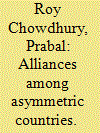

|
|
|
|
|
| Publication |
2007.
|
| Summary/Abstract |
We examine alliances between asymmetric countries. We find that the results depend on the nature of the equilibrium. If the equilibrium is an interior one then, with an increase in asymmetry, the level of the alliance-wide defense good decreases and the divergence between the first best and the equilibrium level of the defense good increases. In the case where the equilibrium involves a corner solution, these results are reversed. It may be argued, however, that the interior equilibrium case is the more relevant one.
|
|
|
|
|
|
|
|
|
|
|
|
|
|
|
|
| 2 |
ID:
123595
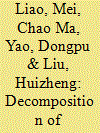

|
|
|
|
|
| Publication |
2013.
|
| Summary/Abstract |
This article uses the concept of embodied exergy as metrics in designing incentive policy instruments to tackle the inefficiency of energy operations. Based on the second law of thermodynamics and energy's economic properties as both a private commodity and a public good, it maintains that energy can be measured by separating the useful exergy embodied in a manufactured product from its waste exergy (anergy) as emissions and sunk wastes in a production process. It is rational to benchmark the content of useful exergy embodied in products for any incentive policy design to encourage green production. This article uses trade data between China, Japan and the EU countries to compare the embodied exergy and waste exergy embodied in traded manufactured products. It proposes using a negative value-added tax as an incentive instrument instead of full-scale carbon tariffs to encourage green production and to fence against carbon evasion behaviour.
|
|
|
|
|
|
|
|
|
|
|
|
|
|
|
|
| 3 |
ID:
108826
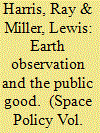

|
|
|
|
|
| Publication |
2011.
|
| Summary/Abstract |
The term 'public good' is often used in satellite Earth observation to indicate that Earth observation data are of value or interest to the public. In fact, the term 'public good' has a more specific meaning, originating in the discipline of Economics, which carries with it a set of assumptions and implications about how markets operate. In this context a public good has two main characteristics: non-rivalry and non-excludability. In their most common digital format, Earth observation data can appear to be both non-rivalrous and non-excludable. However, it is not the digital medium itself which controls the 'publicness' of a good but the conditions of access to that good. This paper explores the meaning of the concept of public goods in an Earth observation context by, first, examining public good theory and related concepts of categories of goods and, second, applying the concepts to nine Earth observation missions, programmes and data.
|
|
|
|
|
|
|
|
|
|
|
|
|
|
|
|
| 4 |
ID:
164653
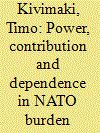

|
|
|
|
|
| Summary/Abstract |
This article offers three new types of variables for computation of the share that NATO countries should contribute to the common defence. I use Uppsala conflict data (UCDP) on conflict participation to reveal how the asymmetry in power that allows the US to define most of the framings on which NATO’s utility calculations are based, compensates for the greater material contribution made to NATO by the US. Then I follow Ringsmose’s model of NATO burden sharing and create two types of variables crucial to the calculation of burden sharing. One reveals the share of US military protection aimed at protecting its NATO allies. The other measures how much US global security efforts against tyranny and terror are dependent on NATO allies. These two variables are developed by means of computer-assisted discourse analysis of US Presidential Papers. The three new variables contribute to a more complex mathematical model on fair burden sharing, indicating at the same time that the imbalance between US and allied contributions is declining. If European allies have ever exploited the United States in the past, then at least the relationship has become more even during the past two decades.
|
|
|
|
|
|
|
|
|
|
|
|
|
|
|
|
| 5 |
ID:
086630
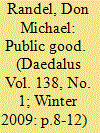

|
|
|
|
|
| Publication |
2009.
|
| Summary/Abstract |
While we have much to celebrate, our democracy needs continuing attention. We might well take the view that it needs more attention now than it has in some time.Consider the terms " the public good" "knowledge," and "a democratic society.
|
|
|
|
|
|
|
|
|
|
|
|
|
|
|
|
| 6 |
ID:
091032
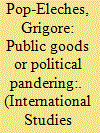

|
|
|
|
|
| Publication |
2009.
|
| Summary/Abstract |
This article uses empirical evidence from Latin American and East European International Monetary Fund (IMF) programs from 1982 to 2001 to analyze the nature and the extent of preferential lending practices by the IMF. Unlike prior work, which focused on narrow political interference from large IMF member states, the present analysis differentiates between such narrow interests and the Fund's international systemic responsibilities, which may justify the preferential treatment of systemically important countries to prevent broader regional or global crises. The empirical results suggest that systemically based deviations from technocratic impartiality predominate in situations-such as the Latin American debt crisis-where international financial stability is under serious threat. Under such circumstances, economically important countries do receive preferential IMF treatment but only when experiencing severe crises, while narrow "private goods" considerations are largely sidelined. When systemic threats are less immediate-such as in Latin America and Eastern Europe in the 1990s-IMF favoritism reflects a more volatile and region-specific mix of private and public considerations in line with the changing interests of powerful Western nations in the developing world.
|
|
|
|
|
|
|
|
|
|
|
|
|
|
|
|
| 7 |
ID:
121053
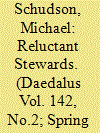

|
|
|
|
|
| Publication |
2013.
|
| Summary/Abstract |
Journalists are reluctant stewards for democracy because they believe that democracy makes citizens their own stewards. They resist donning the mantle of moral guides on behalf of those who are authorized to guide themselves. Yet sometimes journalists do exercise responsibility for the public good in ways that are not subsumed under their professional duty to be nonpartisan, accurate, and fair-minded. Examining some of these exceptions, this essay argues that journalistic stewardship should be loosely defined, decentralized, multiform, and open to invention. In fact, today's economic crisis in journalism (and the identity crisis it stimulated) has launched a new set of initiatives - from fact-checking to organized crowd-sourcing - that have each sought to address a specific problem of democracy, truthseeking, or the public good. Pluralism, pragmatism, and decentralized invention may do better at stewarding democracy than a coherent philosophy of moral guardianship ever could.
|
|
|
|
|
|
|
|
|
|
|
|
|
|
|
|
| 8 |
ID:
157183
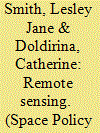

|
|
|
|
|
| Summary/Abstract |
This paper discusses whether current international and national regulation of remote sensing activities achieves a true balance between proprietary interests of producers of remote sensing data and information and the needs of the community in accessing that data and information. By subjecting remote sensing data to general copyright restrictions that are often coupled with exclusive licences, irrespective of type or use of data and/or information, the development of important secondary information markets could be negatively hampered. In the long run, over-regulating access to space data may prove counter-productive in the information age. Using examples of different modes of information dissemination currently being practised, the paper highlights the balances to be drawn between legal issues of private ownership of data and information and public good interests. It concludes with suggestions for a more coherent regulatory approach.
|
|
|
|
|
|
|
|
|
|
|
|
|
|
|
|
| 9 |
ID:
109191
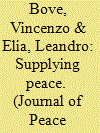

|
|
|
|
|
| Publication |
2011.
|
| Summary/Abstract |
We explore the supply side of peacekeeping - the determinants of a country's voluntary contributions to peacekeeping operations. We focus on troop contribution and examine a large set of operations, from UN-led missions to operations led by NATO, the African Union, the European Union, and ad hoc coalitions. We rely on a theoretical model of the private provision of public goods and a dataset on troop contribution across 102 states and 45 operations from 1999 to 2009 to explain both the conditions under which third-party actors are more or less likely to intervene in peacekeeping operations and the factors determining the size of their personnel contribution. We use the characteristics of the conflict to identify which types of conflicts attract outside intervention and the characteristics of the intervener to identify the countries more willing to provide troops. We show that at the domestic level, contributions are driven by the comparative advantage in manpower - or the relative value of labor - and constrained by the tolerance of casualties and the sustainability of multiple and concurrent missions. At the international level, the most robust explanations of when states choose to intervene are the level of threat to global and regional stability, the proximity to the conflict area, and the number of displaced people. In particular, security and humanitarian concerns trigger nation-specific responses. Our empirical findings provide further evidence of the centrality of country-specific gains in explaining the participation in peacekeeping. However, contributor-specific benefits play the same role in UN and non-UN peacekeeping missions, in contrast with previous empirical studies on the financial burden-sharing.
|
|
|
|
|
|
|
|
|
|
|
|
|
|
|
|
| 10 |
ID:
109902
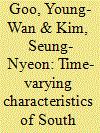

|
|
|
|
|
| Publication |
2012.
|
| Summary/Abstract |
This paper investigates the nature of two military alliances under Chinese threat. The findings are as follows: First, South Korea does not consider China a significant threat while Japan and the United States have recognized China as a serious threat since the 1990s and the 2000s, respectively. Second, the relationship between South Korea and the United States is a true military alliance for all time periods, but the nature of the alliance has changed since the 1970s. Third, although Japan began to form an alliance relationship with the United States in the 1990s, Japan is considered a more significant ally by the United States. This paper implies that, should China provoke a military confrontation, it might be difficult to deduce a common solution among the three countries because of the different response to military threats from China.
|
|
|
|
|
|
|
|
|
|
|
|
|
|
|
|
| 11 |
ID:
121051
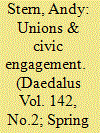

|
|
|
|
|
| Publication |
2013.
|
| Summary/Abstract |
American trade unions are a crucial segment of civil society that enriches our democracy. Union members are stewards of the public good, empowering the individual through collective action and solidarity. While union density has declined, the U.S. labor movement remains a substantial political and economic force. But the relentless attacks by the political right and its corporate allies could lead to an erosion of civic engagement, further economic inequality, and a political imbalance of power that can undermine society. The extreme assault on unions waged by Republicans in Wisconsin, Ohio, Michigan, and at a national level must be countered by a revitalized labor movement and by those who understand that unions are positive civil actors who bring together individuals who alone have little power. Unions need both structural reform and greater boldness; there are moments in which direct action and dramatic militancy can bring about positive social change. The current assault on labor can be rebuffed, and unions can expand their role as stewards for the public good and as defenders of efforts by the 99 percent to reduce inequality and protect democracy.
|
|
|
|
|
|
|
|
|
|
|
|
|
|
|
|
| 12 |
ID:
131363
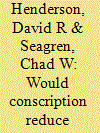

|
|
|
|
|
| Publication |
2014.
|
| Summary/Abstract |
An increasingly popular justification for conscription is that it would increase the probability that the "children" of politically powerful people would serve in the military, thus giving them an incentive to lobby against war. However, this argument neglects the fact that avoiding war for a nation is a public good and is, therefore, subject to the classic free-rider problem. Under-provision of anti-war agitation from those seeking to avoid the draft is exacerbated by the fact that seeking a deferment provides an alternative with a superior private payoff. Empirical findings since World War II are consistent with our thesis.
|
|
|
|
|
|
|
|
|
|
|
|
|
|
|
|
|
|
|
|
|